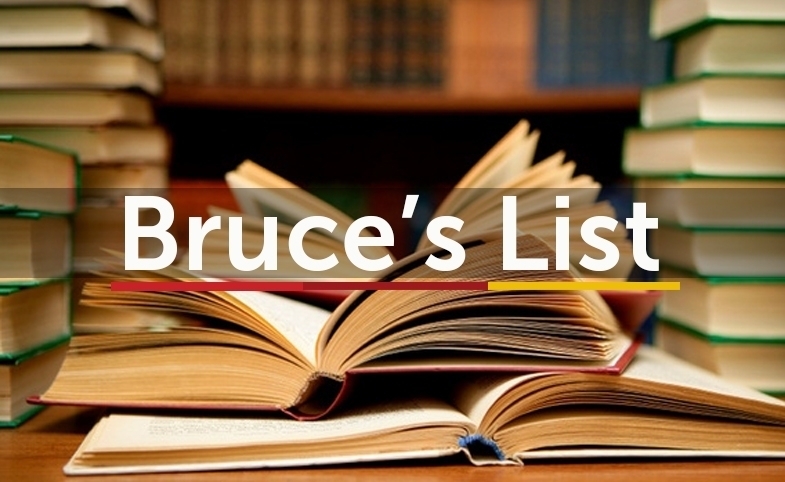The November edition of CPD Faculty Fellow Bruce Gregory's public diplomacy reading list is now available. Known affectionately at CPD as "Bruce's List," this list is a compilation of books, journal articles,...
KEEP READING
Latest Must-Reads in Public Diplomacy: November 2017
The November edition of Bruce Gregory's public diplomacy reading list is now available. Known affectionately at CPD as "Bruce's List," this list is a compilation of books, journal articles, papers and blogs on a wide variety of PD topics and features a number of CPD scholars. Highlights from this latest list include:
Janna Anderson and Lee Rainie, “The Future of Truth and Misinformation Online,” Pew Research Center, Internet & Technology, October 19, 2017. Anderson (Elon University’s Imagining the Internet Center) and Rainie (Pew) posed the following question to 1,116 internet and technology experts. Will trusted methods emerge to block false narratives and allow accurate information to prevail in the online information environment during the next 10 years? Or will the quality and truth of online information continue to deteriorate? The study finds consensus that “the current environment allows ‘fake news’ and weaponized narratives to flourish.” But respondents are evenly divided on the future. 51% believe the situation will not improve; 49% forecast improvement. The report summarizes their wide diversity of views on strategies, the impact of new technologies and the influence of social divisions and human nature. See also “Tech Experts Split on Whether People and Technology Can Conquer Misinformation Online,” October 19, 2017.
“City Diplomacy,” Public Diplomacy Magazine, USC Center on Public Diplomacy, Issue 18, Summer/Fall, 2017. Scholars and practitioners in this timely edition of PD Magazine examine city diplomacy, an increasingly important category of diplomatic study and practice attributed to urbanization, the rise of populism, the growth and power of megacities, and their capacity to wield diplomacy on critical global issues more effectively than state-based actors. Their articles address a variety of topics: city networks, countering violent extremism, culture, sports, climate, immigration, city branding and governance. Particularly useful is the overview essay on “City Diplomacy in the Age of Brexit and Trump” by Benjamin Leffel (University of California, Irvine) and diplomacy and urban theory scholar Michele Acuto (University College London) who has written extensively on the subject. Also included is Nicholas Cull’s thoughtful memorial tribute to the late Ben Barber, his life, scholarship and contributions to the work of the USC Center on Public Diplomacy.
Nicholas J. Cull, “Soft Power’s Next Steppe: National Projection at the Astana Expo,” Place Branding and Public Diplomacy, 2017, 13:269-272. Cull (University of Southern California) evaluates national pavilions and spaces at Kazakhstan’s recent international expo. Its theme: “future energy.” He offers brief descriptions and judgments on their strengths and limitations and usefully frames his essay in the context of “world” and “specialized” expos of the past. Expos, for Cull, reflect the competitive use of soft power, place branding and public diplomacy by states. He awards high marks to Austria, the UK, Japan and France. He gives kudos to Kazakhstan for hosting the event and planning for long-term use of the site (reserving judgment on its return on investment). And credit to the U.S. for its excellent deployment of engaging Russian-language qualified student guides (shades of the Cold War), a film portraying American vitality and diversity as the source of its energy (avoiding the issue of U.S. withdrawal from the Paris Climate Accord), a popular cardboard Hollywood sign for selfies (in the social media competition), and the “miracle” that the U.S. found resources to “deliver a solid contribution.”
Dina Smeltz, Ivo Daalder, Karl Friedhoff and Craig Kafura, What Americans Think About America First, The Chicago Council on Global Affairs, 2017. The Chicago Council’s survey, led by experienced public opinion analyst Dina Smeltz, tested the appeal of President Trump’s slogans and ideas among the American public. They found that, aside from his core supporters, most Americans continue to endorse an active role in world affairs and maintaining alliances. A record number say international trade is good for consumers, the economy and job creation. The perceived threat from immigration has gone down, and support for citizenship opportunities has gone up. A majority supports the Paris Climate Agreement. Overall, they conclude, most Americans favor sustaining policies of engagement typical of U.S. administrations of both political parties since World War II.
R.S. Zaharna, “Diversity in Publics and Diplomacy,” Working Paper, Project "Diplomacy in the 21st Century," No. 15, September 2017. Zaharna (American University) argues “Western diplomacy needs an expansive vision of communication to match the global reach of its communication tools.” Diplomatic actors need to give the same intensive attention to what makes communication meaningful as they do to digital communication tools. She urges greater attention in particular to mediating identity and emotion in relations with diverse publics and political actors. Her five-page paper is a menu for further research.
The full list is available here.
Visit CPD's Online Library
Explore CPD's vast online database featuring the latest books, articles, speeches and information on international organizations dedicated to public diplomacy.
Popular Blogs
-
January 29
-
January 20
-
January 28
-
January 2
-
January 8











